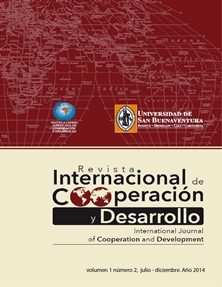INTERNATIONAL JOURNAL OF COOPERATION AND DEVELOPMENT
Assignment of Rights
Authorization for reproduction, publication, communication and distribution of a literary, artistic or scientific
Work.
I , ____________________________________________, author of the book and / or article , of legal age , resident of the city of _________________ , identified with citizenship / passport n° ______________________ issued on _______________________, in exercise of his physical and mental faculties , part henceforth be called the AUTHOR , supports the following authorization to the reproduction, publication, communication and distribution of a work, perform the following terms:
1. Regardless of current legal regulations due to the linking of the parties to this contract, and any kind of legal presumption , the parties agree that the AUTHOR authorize ( name of the publisher ) to reproduce , publish , communicate and distribute the material referred to in the International Journal of Cooperation and Development of the University of San Buenaventura.
2. Such authorization lies in particular on the copyright of the work, by any means known or unknown, publication of the work, distribution of the work , either directly or through third parties for purely educational purposes.
3. AUTHOR agrees to report and declare the existence of this authorization and to preserve the right of the International Journal of Cooperation and Development of the first publication of the work.
4. AUTHOR declares that the article is original and that it is his sole creation, no impediment of any kind exist for the authorization he is doing, besides being responsible for any action claim, plagiarism or other type of claim that might arise about .
5. Such permission is free of charge.
6. Moral copyright in the article are solely the AUTHOR and the University of San Buenaventura expressly agrees to recognize and respect them rigorously.
The Author and / or AUTHORS
SIGNATURE
Abstract
The 1954 U.S. intervention in Guatemala is a controversial key matter that still finds different and opposing interpretations in academia. In this article the impact of the U.S. coup in Guatemala on U.S. - Central America socio-political relations will be evaluated, through the critical analysis of different perspectives and attributes on the subject. This work identifies, with reference to academic theories, key motives and interests behind the intervention, in relation to the significance of Guatemalan democratic president Jacopo Arbenz’ s reforms in the wider social context of Central America. The possible wide-scale impact of these reforms with the creation of viable alternative model to American liberal capitalism and consequently of a perceivable potential threat to U.S. intrinsic interests in its hemisphere, will be reflectively explored throughout with the intent of proposing a solution over the 1954 U.S. intervention.














